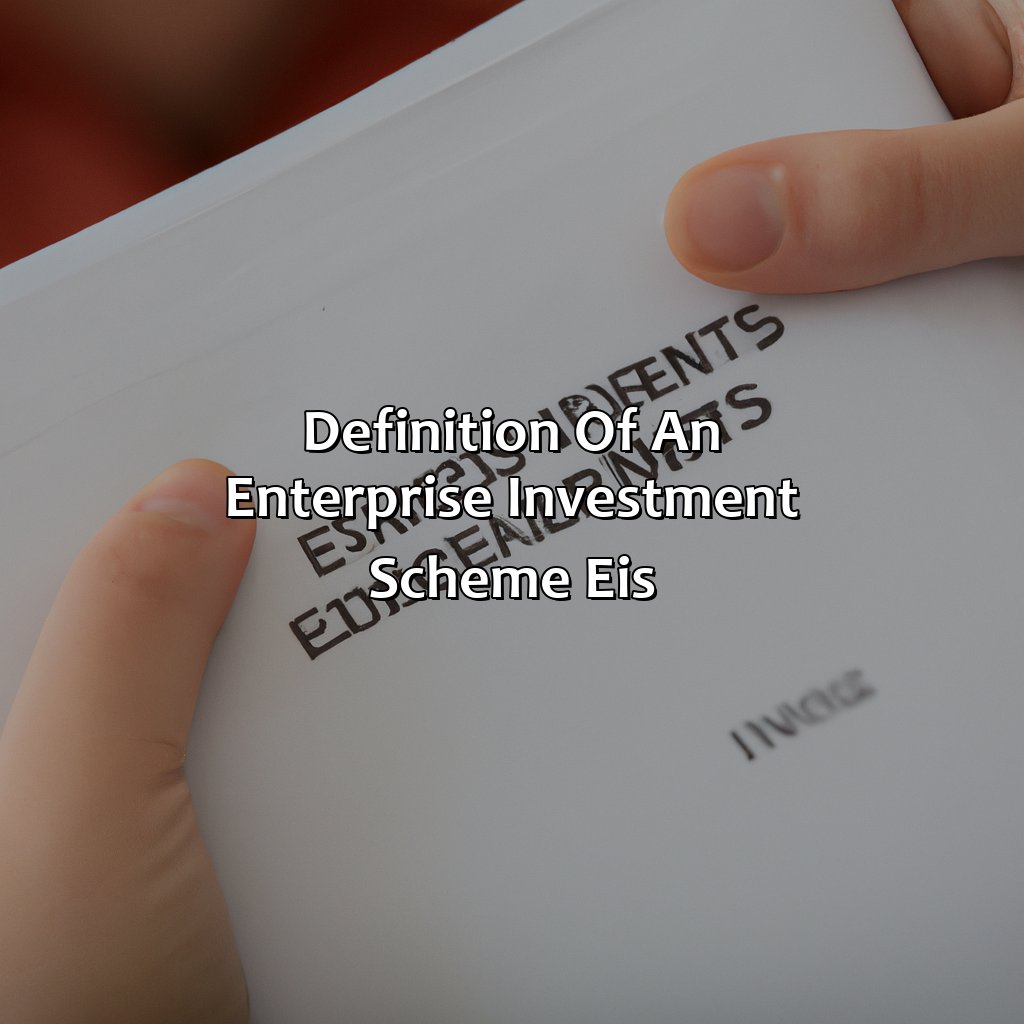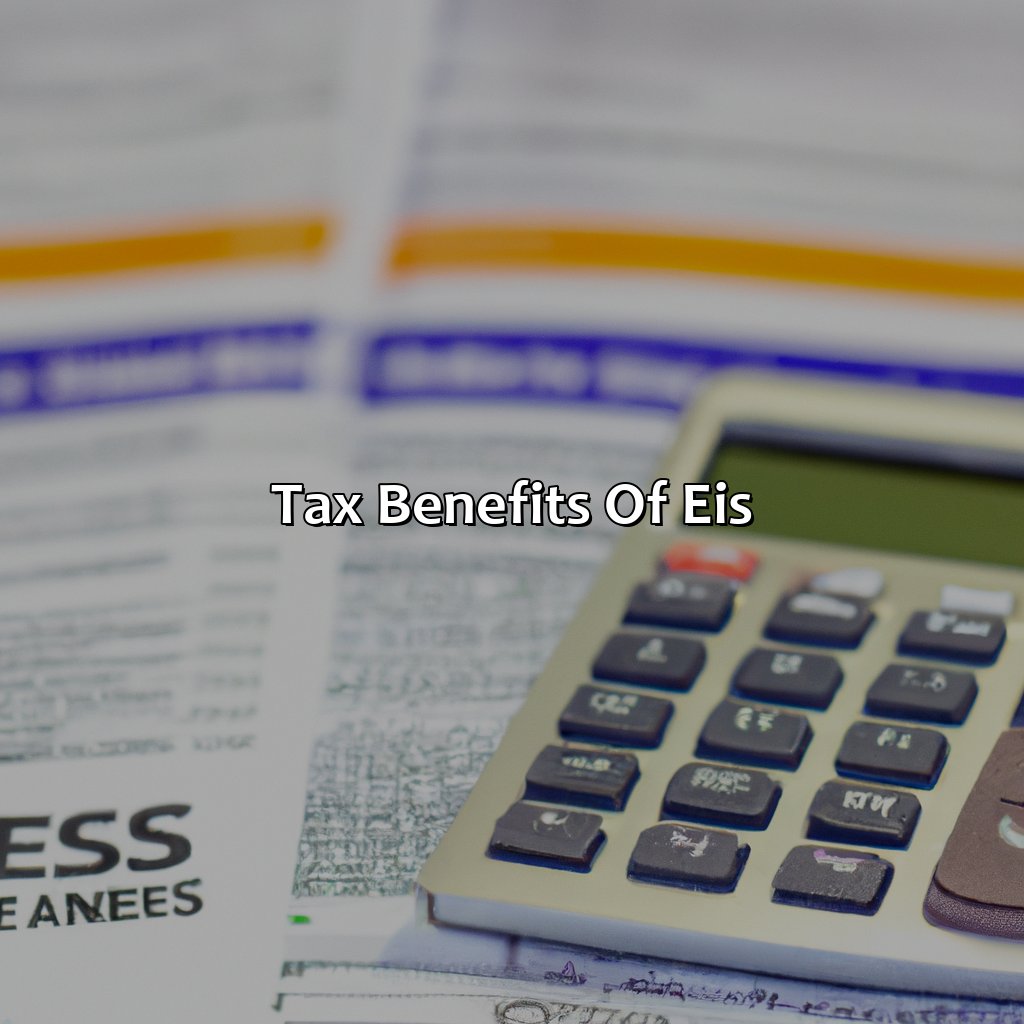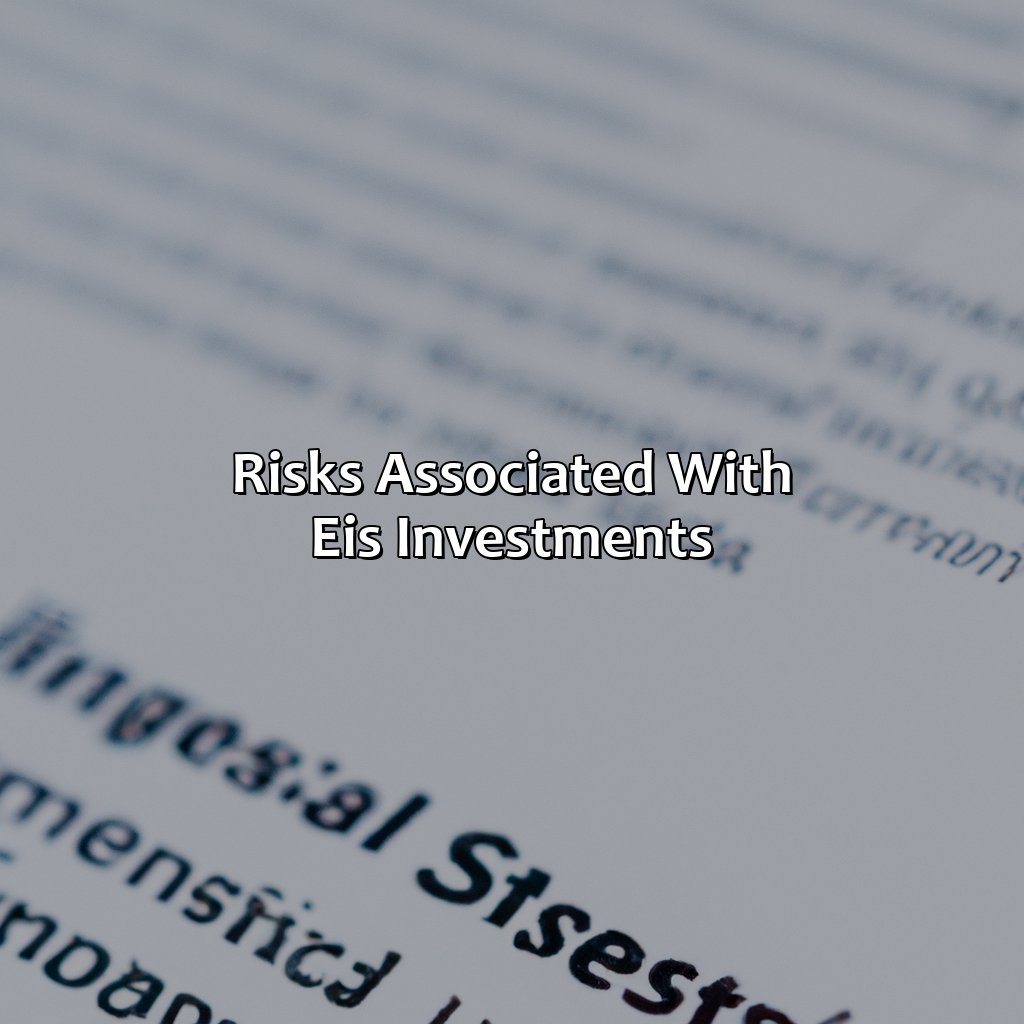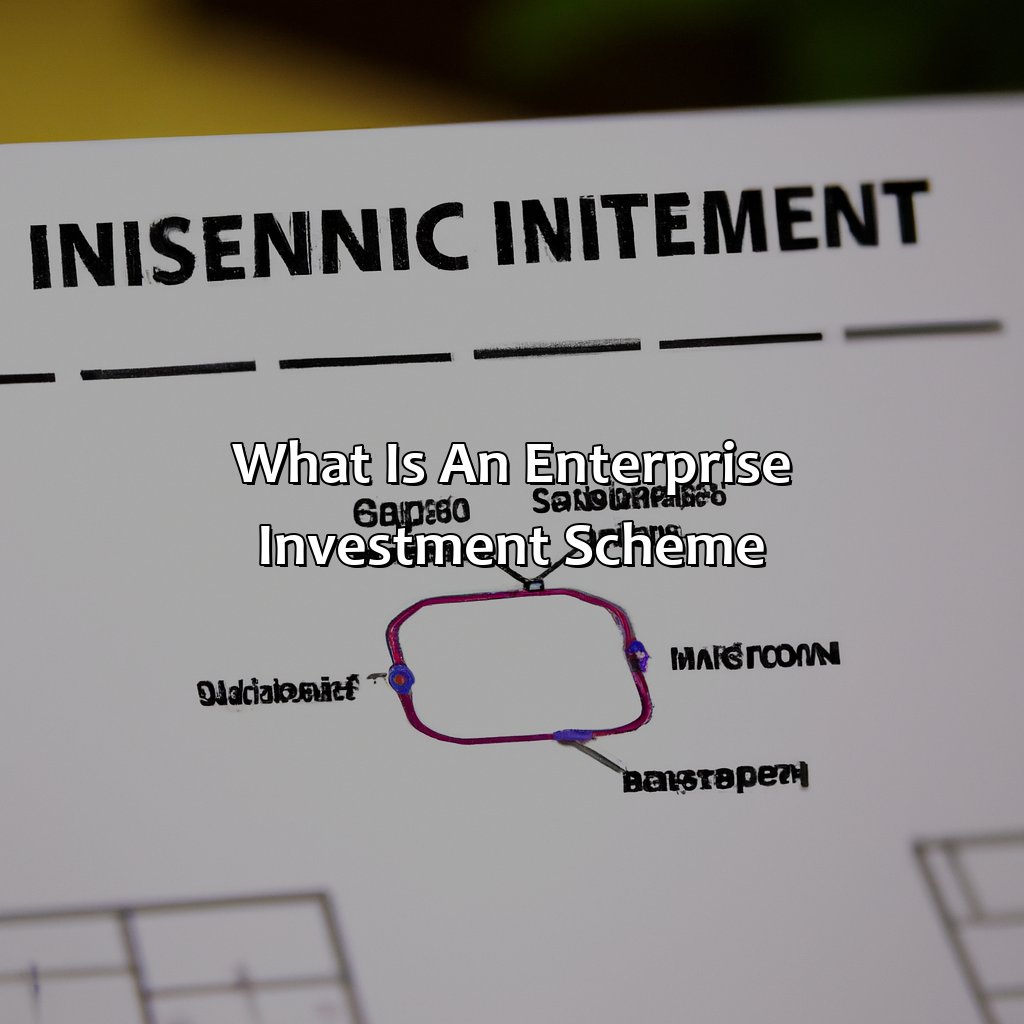What Is An Enterprise Investment Scheme?
Key Takeaway:
- An Enterprise Investment Scheme (EIS) is a government scheme designed to encourage investment in small and growing businesses by offering tax relief to investors.
- Both companies and investors have eligibility criteria that must be met to qualify for an EIS. Companies must be unquoted, have less than £15 million in assets, and employ fewer than 250 employees. Investors must be UK taxpayers and invest no more than £1 million per tax year.
- EIS investments offer several tax benefits, including income tax relief, capital gains tax relief, and inheritance tax relief. These benefits can significantly reduce the overall tax liability for investors.
- EIS investments also come with risks, including illiquidity risk, business failure risk, and limited diversification. Investors should carefully consider these risks before investing.
Are you looking for a way to invest your money and gain tax relief? The Enterprise Investment Scheme (EIS) is a great option for those looking to grow their money and gain tax breaks. In this article, you will learn how an EIS works and the benefits it offers.
Definition of an Enterprise Investment Scheme (EIS)
Enterprise Investment Scheme (EIS) is a government-supported scheme designed to encourage investments in small UK-based companies. EIS offers significant tax incentives to investors and offers a potential for high returns. EIS companies must meet strict criteria and are often considered high-risk investments due to their early-stage nature.
Investors who choose to invest in EIS approved companies can claim tax relief up to 30% of their investment. In addition to this, EIS investments are exempt from capital gains tax (CGT) and inheritance tax (IHT) after three years of holding. However, it is important to note that EIS investments are illiquid and should be considered as a long-term investment.
Moreover, EIS investments are not suitable for everyone as they come with high risk. It is advisable for investors to conduct thorough research before investing and seek professional advice. A pro tip would be to diversify investments and limit the amount invested in high-risk ventures.

Image credits: retiregenz.com by Joel Woodhock
Eligibility for an EIS
Text: Are you eligible for an Enterprise Investment Scheme (EIS)? To find out, check the “Eligibility for an EIS” section. It’s got two subsections:
- “Company Eligibility” and
- “Investor Eligibility”.
These will tell you what your company needs and what you, as an investor, must do to qualify for EIS.

Image credits: retiregenz.com by Harry Arnold
Company eligibility
In determining eligibility for the Enterprise Investment Scheme, there are several criteria that companies must meet:
- They should be unquoted or quoted on AIM.
- Additionally, they should not be controlled by another company, have gross assets of less than £15 million and employ fewer than 250 people.
- The company must also undertake a qualifying trade and use the investment capital raised to grow the business.
It is important to note that some industries such as financial services or property development are excluded from EIS eligibility. This scheme is intended to encourage investment in genuine growth businesses by offering tax reliefs to investors.
The criteria for EIS eligibility may change over time depending on economic conditions and government policies. It is advised that companies seek professional advice before deciding to pursue an EIS.
There have been cases where companies falsely represented their eligibility for EIS and were subsequently investigated by HMRC. In one notable case, an individual was jailed for selling false claims of EIS eligibility resulting in losses of over £2 million to investors.
Want to invest in an EIS? Just make sure you’re not on the FBI’s most wanted list first.
Investor eligibility
Investors who qualify for an EIS involve high net worth individuals, sophisticated investors and Venture Capital Trusts. Requirements include being a UK taxpayer, investing in new shares of an eligible company with over £150,000 fund raising threshold. The investor must not hold more than 30% of the issuing company’s equity or have significant control over it.
To be eligible for EIS relief, the enterprise must operate within specific sectors like technology and science and be less than 7 years old. Companies must also have less than £15 million in assets and fewer than 250 employees. Investors may receive several benefits such as income tax relief up to 30%, deferral relief on capital gains tax among others.
It is noted that over £20bn has been raised through EIS since its inception in 1994 (FT Adviser).
Finally, a tax benefit that doesn’t feel like getting a root canal – the EIS scheme.
Tax benefits of EIS
Comprehending the tax bonanza of the Enterprise Investment Scheme? Look no further! Income tax relief, Capital gains tax relief, and Inheritance tax relief are your keys to unlock the door. These subsections can help to lessen liability and stimulate investment in small, high risk businesses.

Image credits: retiregenz.com by Yuval Jones
Income tax relief
Under the Enterprise Investment Scheme (EIS), investors can receive generous tax incentives known as Equity-based income relief. This incentive allows investors to claim back up to 30% of their EIS investment against their annual income tax bill. For example, if an individual invests £100,000 in an EIS eligible company, they could receive a £30,000 tax relief.
This generous income tax relief is available to UK taxpayers who invest in EIS qualifying companies. However, it’s worth noting that the amount of income tax relief claimed cannot exceed the total amount of income tax payable for that particular year.
In addition, if the investor disposes of their shares prematurely or before completing three years of holding shares from the date of issue, they may be subject to a reduction or withdrawal of this claimed relief.
Pro Tip: If you’re considering investing in an EIS-eligible company to take advantage of income tax benefits offered by EIS, make sure you seek professional help from regulated financial advisors.
Finally, a way to make the government feel better about taking our money- capital gains tax relief through EIS!
Capital gains tax relief
Investors who opt for an Enterprise Investment Scheme (EIS) are eligible for capital gains tax relief. The scheme offers a generous tax incentive for those looking to invest in small and growing businesses. Under this scheme, investors can get up to 30% income tax relief on investments made, which can be carried back to the previous year.
In addition to income tax relief, investors are also exempted from capital gains tax if they hold their shares for three years or more. This means that if they sell their shares after three years of investment, any profits made will be completely free from capital gains tax.
It is important to note that there is a limit of £1 million per annum that can be invested under this scheme, and businesses must meet certain conditions to qualify for the EIS investment.
By investing in companies within the UK’s SME sector through an EIS, investors not only receive significant tax advantages but also support the growth of small and innovative businesses.
Don’t miss out on the opportunity to diversify your portfolio with entrepreneurial potential while reducing your taxes. Consider investing in an Enterprise Investment Scheme today!
“Death and taxes are inevitable, but with EIS, at least your heirs won’t have to pay as much of the latter.”
Inheritance tax relief
Investing in an enterprise investment scheme is not only beneficial for businesses but also for investors. By investing in such schemes, one can avail the advantage of inheritance tax exemption. This implies that if the investor dies after holding the shares for two years, these will be exempted from inheritance tax.
Furthermore, this tax perk provides a considerable incentive to high-net-worth individuals considering investment options. While investing in EIS, it is essential to remember that the minimum holding period should be two years to qualify for this tax relief. Moreover, EIS offers other unique benefits such as income tax relief and capital gains tax exemptions.
It is important to note that different rules apply to beneficiaries who sell EIS shares within three years following inheritance. Thus, it is advisable to seek professional advice beforehand.
In a recent case study by ‘The Financial Times’, Melanie inherited four properties from her mother consisting of apartment complexes and developed lands worth £2 million each. With the help of an EIS scheme catering to real estate development, she was able to invest £500k each in eligible firms with various projects and received a total of 40% tax relief on her investments in less than six months time. Additionally, by investing in growth prospects with higher risks alongside active portfolio management mitigated said risks reducing long-term financial exposure thereby enabling Melanie’s net worth gain several multiples retail value after five years time with no capital gains due to entrepreneurial relief when she liquidated the shares held upon expiry of EIS.
Investing in EIS is like walking through a minefield without a map, but at least the explosions count towards your tax benefits.
Risks associated with EIS investments
Weigh the benefits versus the risks to understand the danger of EIS investments. These can offer tax relief and high returns; but, Illiquidity, Business failure, and Limited diversification are key risks. Knowing these sub-sections can help you make informed decisions when investing.

Image credits: retiregenz.com by David Woodhock
Illiquidity risk
Investing in an enterprise investment scheme (EIS) comes with risks. One of these risks is the potential for illiquidity. Illiquidity risk refers to the possibility that investors may not be able to sell their EIS shares for a significant period, making it difficult to access their invested capital.
This risk arises because companies that raise funds through EIS are typically smaller and less established than publicly traded firms. This means that buyers for EIS shares may be limited, and there may not be an active market for them.
Furthermore, even when buyers do exist, they may only be willing to pay a lower price than the investor originally paid. This can result in a significant reduction in the value of the investment.
To manage illiquidity risk, investors should carefully consider their investment horizon before committing funds to an EIS. They should also ensure that they have sufficient cash reserves available outside of their EIS investment in case unexpected liquidity needs arise.
Another strategy is to select an EIS that invests in a diversified portfolio of companies rather than a single company. This can help spread the risk of illiquidity across multiple investments rather than being concentrated on one specific company.
Ultimately, while illiquidity risk is a real concern for those considering investing in an EIS, there are strategies that investors can use to manage this risk effectively and potentially benefit from the tax advantages offered by these schemes.
Looks like investing in EIS schemes is like playing Jenga, except the blocks aren’t the only thing that can come crashing down.
Business failure risk
Investment in an enterprise can be risky, especially when it comes to business instability. The probability of a business failing is associated with investment-related risks that attract a range of investors. However, there is an enterprise investment scheme for those looking for potential tax reliefs while investing.
When it comes to the business failure risk associated with EIS investments, an investor needs to understand that there is always inherent risk when backing early-stage companies. In most cases, start-ups may have limited financial records and operating history. There are chances of losing all capital invested or receiving few returns as most startups do not generate significant profits.
Despite these factors, investors might still be attracted to enterprise investment schemes due to promising potentials of tax reliefs available from the government. Investing in small startups and companies might be perceived as a significantly lucrative opportunity due to the tax reduction an investor receives.
It’s important for investors that are considering EIS to check eligibility criteria by referring HM Revenue & Customs Regulations before making any commitments. Failing this leaves them vulnerable to having their investment rejected by the scheme partner company.
If putting all your eggs in one basket is risky, then investing in an EIS is like putting all your eggs in a basket made of glass on a bumpy road.
Limited diversification
Investing in an EIS can lead to limited opportunity for diversification. This is because investors are dependent on the performance of the underlying company and cannot easily spread their investments across various sectors. Additionally, EIS investments are not traded publicly, which means that liquidity may also be limited. This lack of diversification and liquidity puts investors at risk of losing their complete investment if the company does not perform well.
Investors should also be aware of capital gains tax (CGT) implications, which may impact their net returns. CGT relief only applies when shares are held for a minimum period of three years, and it’s important to note that this investment style requires long-term commitment.
It’s worth noting that despite these risks, EIS investments can yield high returns if the underlying company performs as expected. The UK government offers significant tax incentives to encourage investment into small and growing businesses through EIS schemes.
One notable example involves Taylor St Baristas Ltd., which raised £1m via an EIS in 2013 but later went into administration due to overexpansion and supply chain issues. As a result, investors lost all of their money within just five years. This serves as a cautionary tale for those considering investing in EIS schemes— thorough investigation is recommended before committing funds.
Five Facts About What Is An Enterprise Investment Scheme:
An Enterprise Investment Scheme (EIS) is a UK government-sponsored program that offers tax benefits to investors who invest in small and medium-sized enterprises (SMEs). (Source: Investopedia)
EIS offers income tax relief of up to 30% for investments in eligible companies, up to a maximum investment of £1 million per tax year. (Source: GOV.UK)
EIS investments are high-risk, but they can offer potentially high returns and diversify a portfolio. (Source: Wealthify)
Eligible companies must satisfy certain criteria to qualify for EIS, such as being unquoted, having fewer than 250 employees, and not exceeding £15 million in gross assets. (Source: SeedLegals)
Investors must hold their EIS shares for at least three years to retain their tax benefits. (Source: BDO LLP)
FAQs about What Is An Enterprise Investment Scheme?
What is an enterprise investment scheme?
An enterprise investment scheme, also known as an EIS, is a government initiative designed to encourage investment in small, high-risk companies. The scheme offers significant tax benefits to investors, including income tax relief, capital gains tax relief, and exemption from inheritance tax.
Who is eligible to invest in an enterprise investment scheme?
Anyone can invest in an enterprise investment scheme, but there are some restrictions. Investors must be over 18 years old, and they must not hold more than 30% of the company’s share capital or be an employee or director of the company. Investors must also be UK taxpayers and must hold the shares for at least three years.
What kind of companies are eligible for enterprise investment scheme investments?
In order to be eligible for enterprise investment scheme investments, companies must meet certain criteria. They must be unquoted, have fewer than 250 employees, have gross assets of no more than £15 million, and must not have raised more than £5 million in total through EIS funding.
What are the tax benefits of investing in an enterprise investment scheme?
Investing in an enterprise investment scheme offers several tax benefits. Investors can claim income tax relief of up to 30% of the amount invested, subject to a maximum investment of £1 million per tax year. Capital gains tax relief is also available, meaning that any gains made from the sale of EIS shares are exempt from capital gains tax. In addition, investors are exempt from inheritance tax after holding the shares for two years.
What are the risks of investing in an enterprise investment scheme?
Investing in an enterprise investment scheme is high-risk, as the companies involved are typically small and untested. There is a risk of losing some or all of the investment, and investors should be prepared to hold the shares for several years before seeing any return. It is important to seek professional advice before investing in an EIS.
How do I invest in an enterprise investment scheme?
Investing in an enterprise investment scheme typically involves finding a company that meets the eligibility criteria, and then subscribing for shares through a qualified EIS provider. Investors should ensure that they understand the risks involved and seek professional advice before investing.
 Checkout this IRS Loophole
Checkout this IRS Loophole 
